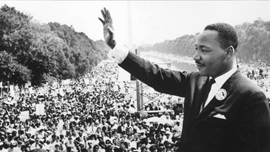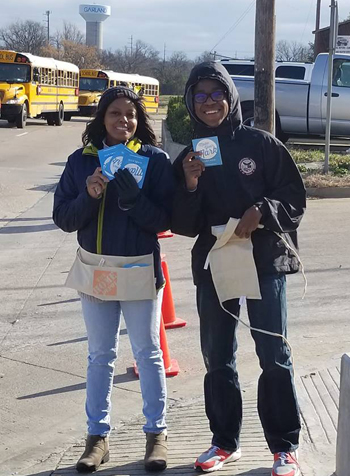The cold temperatures did not stop this weekend’s celebration of the life and work of Dr. Martin Luther King, Jr. A parade was held the morning of Saturday, Jan. 19 and followed by a performance by the Communitywide Youth Choir led by Reuben Lael Griffin. Sunday, Jan. 20, youth groups from area churches and the Garland ISD performed praise dances and step routines. This year’s event marked the 30th anniversary of the NAACP-Garland Unit’s commemoration of the birth of MLK.
Garland’s elected officials, including City Council and GISD Board of Trustees members, along with youth groups, representatives from local churches and high school bands and drill teams who rode in buses because of the weather, were on-hand to participate in the celebration.
About MLK: He was born Michael King, Jr., Jan. 15, 1929, to Michael King Sr. and Alberta Williams King. As a child, he watched his father fight racial prejudice and was taught that an attitude of superiority of any class or race was wrong in God’s eyes. But until he took a Bible class during his junior year in college, the younger King had no intention of entering the ministry. His mind was changed by that class and after graduation he attended Crozer Theological Seminary and graduated at the top of his class.
King met Coretta Scott while he was working on his doctorate at Boston University and they were soon married. He accepted a position as minister at Dexter Avenue Baptist Church in Montgomery, Ala. as he worked on his dissertation and earned his Ph.D. at the age of 25.
He was selected to lead the historic bus boycott in Montgomery after Rosa Parks was arrested for not surrendering her seat to a white man. Additionally, MLK Jr. was one of the 60 ministers who founded the Southern Christian Leadership Conference which organized black churches against racism and planned non-violent civil rights protests.
As a young minister, King brought renewed enthusiasm and strength to the fight for equality. He gave speeches nationwide but none more memorable and beloved than his “I Have a Dream” speech Aug. 28, 1963, which was given at the Lincoln Memorial to more than 200,000 people.
“I have a dream that my four children will one day live in a nation where they will not be judged by the color of their skin but by the content of their character.” — Dr. Martin Luther King, Jr.
Progress in the civil rights movement was slow. In 1965, a march from Selma, Ala. to Montgomery, Ala. became violent as police officers used nightsticks and tear gas against protestors as they tried to cross the Edmond Pettus Bridge. Almost 20 protestors were hospitalized from injuries sustained in the clash with police.
King was not at that march, but at the next one, when he and other demonstrators tried to cross the same bridge, they were met with barricades and state troopers. King instructed his followers to kneel in prayer and remain non-violent. Soon after, in part because of support gained due to the group’s action on the bridge, the Voting Rights Act of 1965 was passed.
He received numerous honors and was named “Time” magazine’s Man of the Year in 1963. At 35, King was the youngest man to receive the Nobel Peace Prize and donated the prize money, more than $50,000, to the civil rights movement. King gave more than 2,500 speeches and wrote five books and numerous articles.
Experiencing indescribable hardships such as arrests, assaults, personal abuse and the bombing of his home, King did more to further the cause of equality than anyone in history.
He was assassinated in Memphis, Tenn. April 4, 1968.



